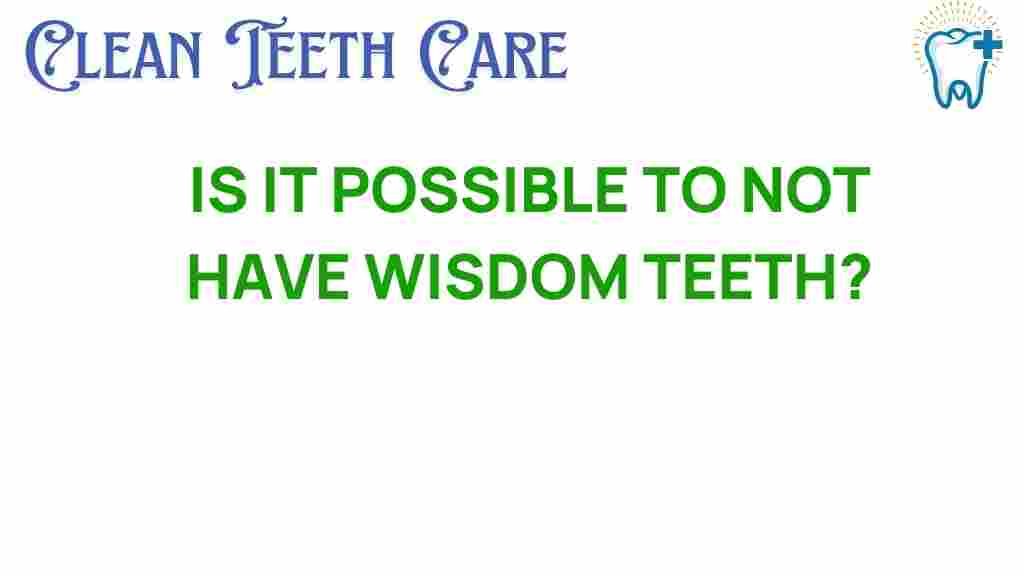The Mystery of Wisdom Teeth: Can You Really Be Born Without Them?
Wisdom teeth, also known as third molars, are often the subject of intrigue and concern for many people. These late-emerging teeth typically appear in late adolescence or early adulthood, and for some, they can lead to complications that necessitate oral surgery. But what if we told you that not everyone has wisdom teeth? This article delves into the fascinating world of wisdom teeth, exploring their development, the role of genetics, and the implications for dental health.
Understanding Wisdom Teeth
Wisdom teeth are the last set of molars that usually come in between the ages of 17 and 25. They are positioned at the back of the mouth, and their primary function is to aid in chewing. However, many people experience issues with their wisdom teeth, leading to pain, infection, or other dental anomalies.
Here are some key points about wisdom teeth:
- Development: Wisdom teeth typically begin to form in the jaw during early adolescence.
- Common Issues: Many individuals experience impaction, where the tooth does not fully emerge through the gums.
- Extraction: Due to potential complications, many dentists recommend the extraction of wisdom teeth.
Can You Be Born Without Wisdom Teeth?
The short answer is yes; some individuals can be born without wisdom teeth. This phenomenon is linked to genetics and is considered a dental anomaly. Studies show that missing wisdom teeth occur more frequently in certain populations. Understanding the genetic factors behind teeth development can shed light on this intriguing topic.
Genetics and Missing Wisdom Teeth
Genetics plays a crucial role in determining whether an individual will have wisdom teeth. Research indicates that:
- **Ancestry:** Certain ethnic groups are more likely to have fewer or no wisdom teeth. For example, East Asians tend to have a higher prevalence of missing third molars.
- **Family History:** If your parents or grandparents lacked wisdom teeth, you might also be more likely to be born without them.
- **Evolutionary Factors:** Some scientists theorize that the human jaw has evolved to become smaller over time, which may affect the development of wisdom teeth.
The Role of Dental Health in Wisdom Teeth Development
While genetics plays a significant role, dental health throughout life can also impact wisdom teeth development. Poor oral hygiene and other dental issues can exacerbate problems related to emerging wisdom teeth. Here are some factors to consider:
- Oral Hygiene: Maintaining good dental care can help prevent infections and complications associated with wisdom teeth.
- Regular Dental Check-Ups: Routine visits to your dentist can help monitor the development of wisdom teeth and address any potential issues early on.
- Diet and Nutrition: A healthy diet supports overall dental health and can influence teeth development.
Common Dental Anomalies Related to Wisdom Teeth
Dental anomalies can manifest in various ways regarding wisdom teeth, including:
- Impacted Wisdom Teeth: This occurs when there isn’t enough space for the teeth to emerge properly, leading to pain and potential infection.
- Hyperdontia: Some individuals may have extra teeth, including additional molars, complicating dental care.
- Missing Teeth: As previously discussed, some people are congenitally missing wisdom teeth.
The Process of Tooth Extraction
If wisdom teeth become problematic, dental professionals often recommend extraction. Here’s a step-by-step overview of the process:
1. Evaluation
Your dentist will conduct a thorough examination, usually involving X-rays, to assess the position of your wisdom teeth.
2. Anesthesia
Before the procedure, you will receive anesthesia to ensure you remain comfortable throughout the extraction.
3. Tooth Removal
The dentist will carefully remove the wisdom teeth, which may involve cutting through the gums or bone if the teeth are impacted.
4. Recovery
Post-extraction, you will receive instructions for care at home, including managing pain and swelling.
Post-Extraction Care
Recovering from wisdom tooth extraction is crucial for your dental health. Follow these tips for a smooth recovery:
- Rest: Allow your body to heal by getting plenty of rest.
- Ice Packs: Apply ice packs to reduce swelling in the initial days post-surgery.
- Soft Foods: Stick to a diet of soft foods like yogurt, smoothies, and mashed potatoes.
- Hydration: Stay hydrated, but avoid straws, as the suction can dislodge blood clots.
Troubleshooting Common Issues
Even with proper care, some individuals may experience complications after wisdom tooth extraction. Here are a few common issues and their solutions:
1. Dry Socket
This painful condition occurs when the blood clot at the extraction site fails to develop or dislodges. To alleviate it:
- Contact your dentist for treatment options.
- Follow post-operative care instructions meticulously.
2. Infection
Signs of infection include increased pain, swelling, and discharge. If you suspect an infection:
- Seek immediate dental care.
- Follow any prescribed antibiotic regimen.
3. Prolonged Swelling
Swelling is common after surgery, but if it persists beyond a few days:
- Consult your dentist to rule out complications.
- Continue applying ice packs as needed.
Maintaining Dental Health Post-Surgery
Ensuring optimal dental health is vital after wisdom tooth extraction. Here are some tips:
- Follow Up: Attend all follow-up appointments to monitor healing.
- Good Hygiene: Maintain regular brushing and flossing habits, avoiding the extraction site initially.
- Healthy Lifestyle: Incorporate a balanced diet rich in vitamins and minerals to support recovery.
Conclusion
The mystery of wisdom teeth and their absence in some individuals highlights the fascinating interplay between genetics and dental health. While many people face the challenges of wisdom teeth, understanding the role of genetics and oral care can help demystify this aspect of teeth development. If you are experiencing issues with your wisdom teeth or have questions about your dental health, consult a dental professional. Proper dental care and regular check-ups are essential in maintaining overall oral health.
For more information on wisdom teeth and dental care, check out our dental health resources. To explore the latest research on dental anomalies and genetics, you can visit this external link.
This article is in the category Conditions and created by CleanTeethCare Team
